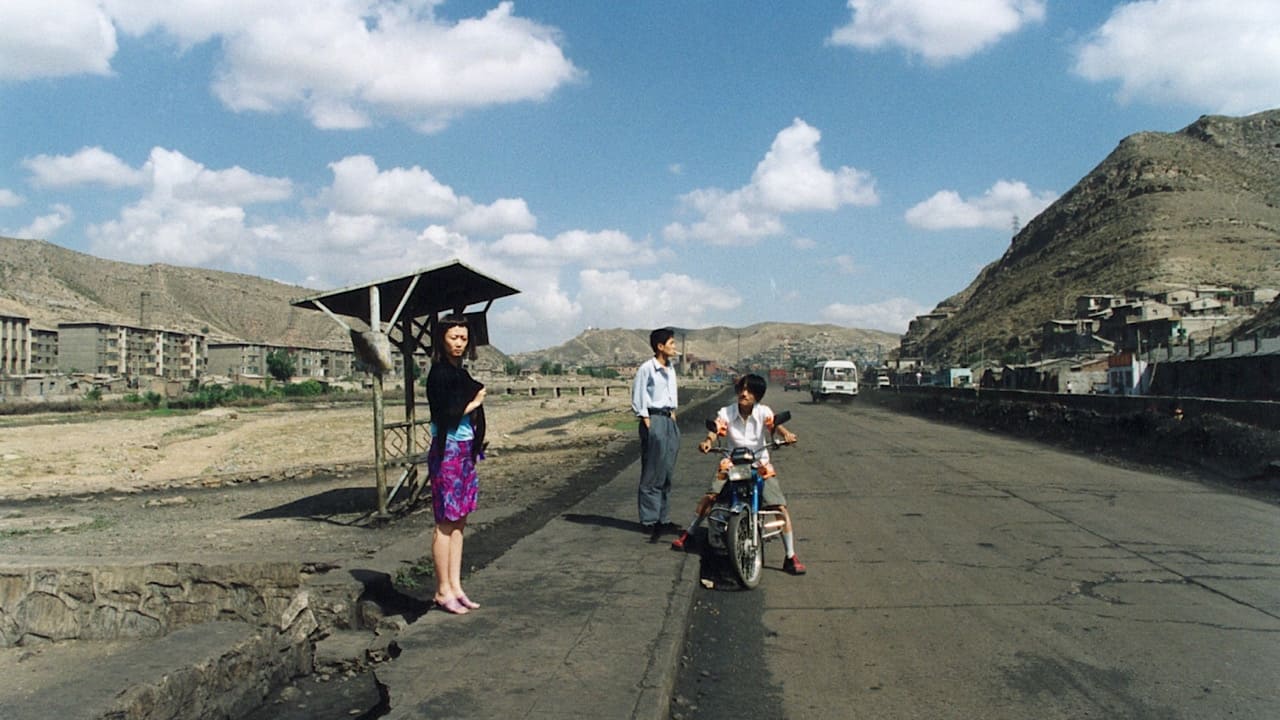Alan Turgutoglu
Unknown Pleasures is arguably one of director Jia Zhangke's finest works, more raw yet subtle than his later, bigger titles. Shot on a simple hand-held system, the low-fidelity image hits us in the face with the dirty and dusty 'real' China, one in which the bare walls of prefab concrete slabs are covered in brown stains in a way that his more recent and better-funded work, A Touch of Sin (2013), can't.As we can read in most other reviews of this film, alienation in the social and economical sense are a key feature in the protagonists' lives. Our two heroes, Xiao Ji and Bin Bin, try to navigate life on the bottom rungs of Chinese society along with the relationships with the women in their lives. They end up doing perhaps the worst heist attempt in the history of cinema. Not a story of the kinds we've never seen before, but where Jia Zhangke excels is telling this story, creating a setting that feels so real that the awkward lives of our heroes are understandable to us, the viewer from a different world. He does that through superb camera and sound direction. The camera is static during most dialogs, confined to the narrow concrete-walled rooms of provincial China. It only moves and pans when it needs to, which is when the character in focus moves, and it only cuts when it needs to. It's very economical in the same way that the Chinese people in these kinds of cities live; having just enough money to live, saving most of their earnings like Bin Bin's mother or just getting by day by day like Bin Bin himself. All the sounds and music in Unknown Pleasures come only from the world in which the scenes take place: the clapping and cheers from audiences, the crying sounds of cheap Chinese opera, background TV chatter, night crowds on the street, the horns and humming cars and other traffic, the advertising jingles and announcements. Where the camera work allows us to focus on the characters, the sound places the viewer inside China, whether it's Datong in 2002 or a third-tier city in 2015. What Jia Zhangke showed me is a China as I remember living it: the same faces, the same clothes, the same environment and sounds. Just as him, I was always living it with a detached lens of an outsider, someone studying these people with a somewhat objective curiosity, with no understanding of their daily lives and feelings. Our ignorant heroes find themselves in circumstances beyond their control, brought upon by their ever-changing social and physical environment.This is of course nothing new as we all know about the conditions of the poor in developing countries, but we need to see the human faces in order to make sense of it. Bin Bin and Xiao Ji may be young, desperate and stupid, and barely able to express themselves in words, but we can understand them. Bin Bin finds himself unable to join the army due to testing positive for hepatitis, a disease entirely preventable with vaccination but still very common in China. He takes to selling bootleg discs, while Qiao Qiao goes back to prostitution even after Xiao San is killed off screen. Being young, desperate and stupid, the two boys settle on a pathetic attempt to rob a bank with a fake bomb made out of cardboard. Bin Bin finds out, after his arrest, that robbery carries the death penalty in China. In the films conclusion, a cop makes him sing "Unknown Pleasures" (Ren Xiao Yao), a pop song based on ancient Chinese philosophy by Zhuangzi, who is quoted by Qiao Qiao and interpreted (wrongly) to mean that they "are free to do anything they like". This misunderstanding is part of their experienced alienation from traditional Chinese culture as well as the contemporary culture which is no longer isolated from the rest of the world. After all, American culture, or better to say pop culture, is omnipresent. These Chinese may live in a backwater town, but they are not wholly ignorant of the world at large. They value the position of their country in the world - outside of the club, the live broadcast of the announcement of Beijing as podium of the Olympic Games in 2008 results in loud celebration from the local men crowded around the one present TV set - and at a same time are aware of rising rivalry with the USA. This is a very crucial part of national identity and globalization: an understanding of where one stands in the 'global hierarchy' of nations. At the same time, misconceptions exist too. Is a dollar bill really worth a thousand Yuans? Is it really as easy to pull off a robbery as in Pulp Fiction? The underlying question is the same: how different, or how much better, would their lives be if they were born in America? Zhangke uses the television screen, specifically the news broadcasts, to relay this sense of Chinese identity in the world to the viewer. The news media give us an even more detached look at the world than the filmmaker's, yet is so important to how millions of people view their position in the world.At his turn, with Unknown Pleasures the director gives us an insight into the alienated youth of a rapidly changing country, into the life of the near-bottom feeders of society, into their relationships and their sense (or lack) of identity, without the production and flash of his later films.
bosscain
When I saw this video in the library the cover was glowing with comments like "Top ten films of the year", "A combination of Godard and Tarantino", "Stunning","Haunting" it put me in the mind-frame that this was going to be a good movie, But in actuality, the comments on the cover could not be further from the truth. I found this movie to me painfully slow, tormentingly dull, and excruciatingly boring, watching paint dry or watching grass grow would be the equivalent.Why it received such high scoring reviews is beyond me.I got an idea, lets make a movie about some dirty,unemployed, one step away from being homeless teenager and film him standing on a street corner smoking, then lets film the same teen eating a bowl of rice and arguing with his mom, then lets film him in a pool hall just sitting on a bench talking to his friend. WOW! that would make a great movie. Maybe in China but not here in the US. 1/10
George Parker
The title of this film is a fitting description of its entertainment value. The story is a kind of lame social statement about creeping Westernism in China as viewed from the slums. However, the story is so trite, so cliche, so thin, and something we've already been through with Japan in a slew of films, it can't overcome the perfectly awful production value, poor quality of execution, and time wasting filler. The litnay of deficits is too long for this forum. But, for those who may want to give "Unknown Pleasures" a try on DVD, be advised that the DVD I watched had no CC and the default setting for subtitles was *** (three asterisks) and "off". English language subtitles did appear, however, after switching to "on" even through the *** generally means no subtitles available. FYI. (C-)
Howard Schumann
Unknown Pleasures, directed by Jia Zhangke, powerfully brings home the spiritual malaise affecting Chinese youth as a result of global capitalism. Although the film is set in a small, impoverished Chinese city in remote Shanxi province close to the Mongolian border, there is almost nothing traditionally Chinese in this film other than the location.
Two 19-year olds, Bin Bin (Zhao Wei Wei) and Xiao Ji (Wy Qiong) are heavily influenced by American culture and seem to exist only for their own immediate pleasure. They live on the margins in a city where, according to the director, two-thirds of the population were unemployed in 2001. They drink coke, chain smoke cigarettes, covet U.S. dollars, talk excitedly about Hollywood movies such as Pulp Fiction, and dance to Western-style music at the local club. In the words of Kent Jones (Film Comment Sept/Oct 2002), the protagonists are "media-addicted, resigned to momentous change, and powerless to understand or affect it". Bin Bin lives with his mother (Bai Ru), who works at a local textile factory and sympathizes with the Falun Gong (an extreme Buddhist religious sect that has been persecuted by the Chinese Communist government). Apathetic and disengaged with no job and nothing to do, the two friends hang around the local community center playing pool and chatting with the regulars. After trying out for an acting job, Xiao Ji becomes attracted to Qiao Qiao (Zhao Tao) whose protective lover is gangster Quiao San. Xiao follows her around but seems unable or unwilling to make a move. When they finally go dancing, Xiao has to confront the threats of Quiao San's goons who finally catch up with him and slap him around. Bin Bin also has a girlfriend, Yuan Yuan (Zhou Qing Feng), but their romance seems to consist only in watching movies in a hotel room and singing popular songs (whose words suggest their own lives). Yuan Yuan has more purpose in life than Bin Bin and wants to study International Trade in Beijing. In a scene depicting Jia's wry humor, Xiao Ji puts Yuan's studies in perspective by saying, "WTO is nothing. Just a trick to make some cash" and Bin Bin declares to Yuan Yuan, " It is said that international trade is about buying rabbits to resell in the Ukraine." With little interest in common, they slowly drift apart. In a very telling scene, as Bin Bin sits in a booth in the inside of a train station staring blankly, Yuan Yuan rides her bicycle around and around, waiting for him to throw off his lethargy and join her.
Though the boys hear about events in the outside world on television, for example, the winning of the Olympic Games by Beijing and the arrest of the leaders of the Falun Gong in Japan, they don't seem affected. Seemingly inured to unexplained violence, they are just mildly perplexed when a bomb explodes nearby with tragic results. Bin Bin asks whether the United States is attacking China.Shot in digital video that enhances its authenticity, Jia avoids pathos and sentimentality for a documentary-style realism that is deeply affecting. Although he focuses on the boys as victims of social and economic dislocation in China, the theme is more about feelings of abandonment, loneliness, and emotional numbness. Jia, one of the best of China's new generation underground "indie" directors, has captured this sense of ennui more palpably than any movie I've seen in a long, long time. When Xiao finally abandons his sputtering motor bike in the middle of a new superhighway, Jia seems to be suggesting that both he and China itself are at a precarious crossroads in their existence and must discard what isn't working if they are to move on.


 AD
AD


